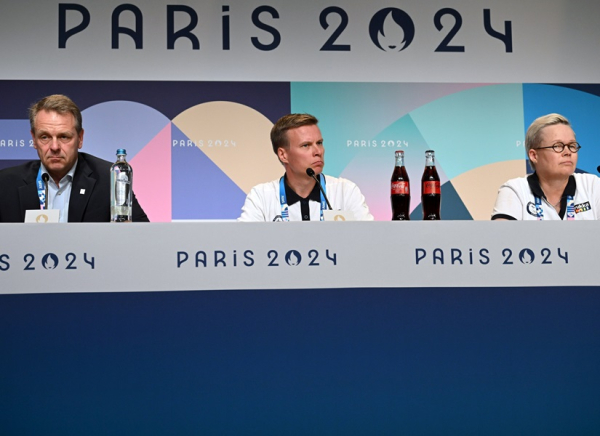
Jan Vapaavuori, Matti Heikkinen and Leena Paavolainen from the Finnish Olympic Committee held a press conference at the closing of the 2024 Paris Summer Olympics on Sunday, 11 August 2024. The newly concluded games marked the end of Finland’s 116-year medal streak in Summer Olympics, according to YLE. (Antti Aimo-Koivisto – Lehtikuva)
- Next Article Finnish authorities intensify efforts to prevent oil spill from WWII shipwreck
THE 116-YEAR MEDAL STREAK of Finland in Summer Olympics ended last Sunday in Paris, France.
Finns are not pleased.
“The feedback has been harsh and honest,” Matti Heikkinen, a director of elite sports at the Finnish Olympic Committee, was quoted saying at a news conference in the city of lights by Helsingin Sanomat.
Both Heikkinen and Jan Vapaavuori, the director general of the Finnish Olympic Committee, admitted that the results are disappointing, wrote YLE. Humu, a programme to transform elite sports that was launched to great fanfare in 2010, has been an expensive failure, the latter added – echoing but not quite matching severity of the criticism levelled by other decision-makers in sports.
“This is the time for a pause. Now there’s real momentum to look ahead and make the necessary changes if and when we want to return to the podium in the summer Olympics,” commented Heikkinen.
Jari Lämsä, an expert at the Finnish Institute of High Performance Sport (Kihu), reminded the public broadcasting company that the results have long suggested a zero-medal showing is possible, pointing to the summer games held in 2004, 2016 and 2021.
“We were long on the kind of trend that this really shouldn’t surprise anyone,” he said on Sunday.
Altogether 91 countries won at least one medal at the 2024 Paris Olympics. Denmark, Norway and Sweden together came away with 28 medals, including 10 golds.
YLE on Sunday revealed that decision-makers in sports widely point to the same underlying problem: elite athletics are only a part – an increasingly marginal part, according to many – of the operations of the Finnish Olympics Committee. Riikka Pakarinen, the chairperson of the Finnish Athletics Federation (SUL), encouraged leading sports organisations to examine in depth the umbrella-like role of the committee, one she believes it not beneficial for elite sports.
“It has to be separated completely from the other operations. At its core it’s so different from exercise or even so-called ordinary competitive sports. There are plenty of reasons to consider whether the committee’s other operations include something that sports associations and clubs could handle,” she said to the public broadcaster.
Valentin Kononen, a former race walker and current coach of Aku Partanen, said Finland should waste no time in implementing recommendations forwarded in a critical assessment published in 2022. The Finnish-Danish report described Finland as a competitive sporting rather than elite sporting country, a level that is not enough to succeed at the Summer Olympics.
“The recommendations haven’t been implemented at all,” he lamented.
He also rejected the argument that the problem could be solved by throwing money at it. “Current public investments would make it completely possible to get a much better result from the Summer Olympics. It’s simply a question of using the money smartly,” he said.
“The Olympics’ medal level covers about one per cent of athletes, and the most important thing is to support the one per cent at the end of the pipeline, which will make the difference. That’s one per cent of one per cent,” he added. “That means you have to make sure that a fairly limited group of athletes and coaches are in the best possible position. The issue is as simple as that from the viewpoint of Olympic success.”
The Olympic Committee’s elite sports division annually disburses about 6.7 million euros in support to disciplines and individual athletes, with 4.2 million euros of the total targeted at summer sports. Almost two-thirds of its budget is provided by the central administration.
Altogether the central administration provides annually roughly 20 million euros in funding with some link to elite sports, such as to sports academies, training centres and Kihu.
In the near future, though, the state is expected to tighten its purse strings due to the general economic situation.
While sponsors support sports annually to the tune of 150 million euros, the vast majority of the funding is targeted at leading team sports. Relative to population, the amount of sponsor support is 2.5–3.0 times higher in other Nordics.
Aleksi Teivainen – HT
- Next Article Finnish authorities intensify efforts to prevent oil spill from WWII shipwreck
Source: www.helsinkitimes.fi
